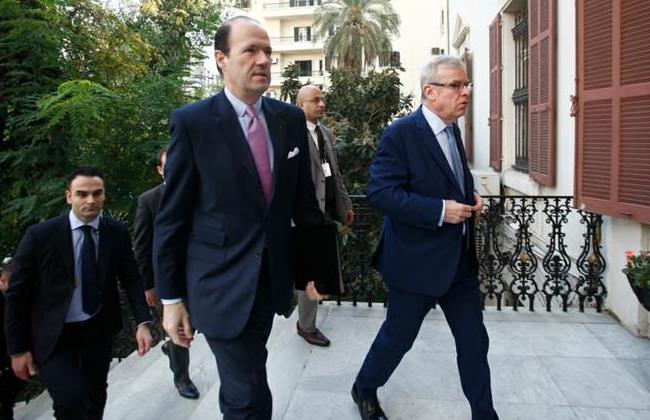France pushing for election of consensus president
Antoine Ghattas Saab/The Daily Star/Dec. 15, 2014
France, out of its commitment to protect Lebanon’s independence, sovereignty and free decision-making, is determined to push for the election of a consensus president as the only way to end the deadlock that has left the country without a head of state for more than six months, diplomatic sources said. The sources said last week’s visit to Beirut by Jean-Francois Girault, chief of the French Foreign Ministry’s Middle East and North Africa Department, underscored France’s increasing concern over the Lebanese presidential stalemate that has paralyzed Parliament legislation and is threatening to cripple the government’s work.
Girault, who attended most of premier Tammam Salam’s meetings with senior French officials in Paris last week, is expected to leave for Iran soon and later for Saudi Arabia as part of his shuttle diplomacy to resolve the presidential crisis in Lebanon, the sources said.
Regional heavyweights Iran and Saudi Arabia wield great influence in Lebanon, where Tehran and Riyadh back opposing sides.
During his two-day visit to Beirut, Girault warned rival Lebanese leaders he had met of the dangers surrounding Lebanon as a result of the continued presidential vacuum and the war in Syria, now in its fourth year. He also said France was ready to facilitate an agreement among the rival factions on the election of a consensus president.
France, Lebanon’s former colonial power, will not allow the country to collapse and is closely following up the situation, either through its envoys to Beirut, the French Embassy’s reports or by keeping track of the Lebanese crisis from Paris to propose necessary solutions, the sources said.
On this basis, sources in the French capital said that Paris had formed a parliamentary panel from the Foreign Affairs Committee with the participation of heads of rightist and leftist blocs who would visit Beirut soon for talks with Lebanese officials on Lebanon’s military, economic and technical needs.
One major outcome of Salam’s three-day official visit to Paris last week and his talks with French President Francois Hollande was that the latter had ordered the acceleration of a French arms delivery to the Lebanese Army paid for by a $3 billion Saudi grant.
The diplomatic sources who participated in Girault’s meetings in Beirut said that the French envoy’s activity was exploratory, as is the case with most foreign envoys who visit Lebanon in an attempt to examine the paralysis that has hit the presidency.
The sources said Russian Deputy Foreign Minister Mikhail Bogdanov’s meetings with rival Lebanese leaders in Beirut earlier this month were not merely to discuss the presidential crisis.
Russia, like Iran, is suffering from lower oil prices and is trying to employ its efforts in Syria, Iraq and Lebanon in order to improve the conditions of negotiations with the West over the Ukraine crisis, the sources said.
Similarly, Iran is obstructing a political solution in Lebanon, Iraq and Syria until it is rewarded in its negotiations with Western powers over its nuclear program, they added.
At the peak of regional complexities, there are internal Lebanese demands for holding the presidential vote without waiting for months for external agreements to speed up a political solution in Lebanon.
According to the sources, the few remaining weeks of this year will witness stepped up activity by foreign officials in tandem with internal political moves, mainly the planned talks between the Future Movement and Hezbollah and attempts to hold an inter-Christian dialogue between Free Patriotic Movement leader MP Michel Aoun and Lebanese Forces chief Samir Geagea aimed at setting the stage for the election of a consensus president.
Among the foreign officials to visit Lebanon could be an envoy from the Vatican to convey its call on Lebanese officials to quickly elect a president, the sources said.
Parliamentary sources in both the LF and FPM said if the ongoing internal attempts, backed by regional and international powers, produced results, the election of a president could be expected next spring.
While contacts continue between Christian politicians, and between Maronite Patriarch Beshara Rai and Maronite political leaders, sources familiar with these communications said that most of the Christian leaders have become convinced that Lebanon’s next president will be a consensus candidate. This virtually rules out both Aoun and Geagea as candidates for the presidency.
The sources quoted Aoun’s visitors as saying the FPM leader was inclined toward this conviction, but asked what other choice he would be given if he accepted to pull out of the presidency race.
For his part, Rai was quoted as expressing cautious optimism about the election of a compromise president in the first three months of the new year.
















